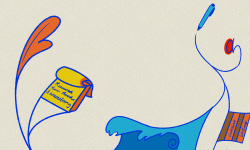Last semester, I found myself surrounded by waves of nonbelievers at the Reason Rally, a forum for secular thought held at the National Mall. As the virulent freethinkers indulged themselves with their “superior” mental adroitness, I felt torn; the bashing of the Catholic church, an activity I now frequently engage in, hit a sensitive chord when it came out of the mouths of lifelong atheists.
You see, I was a believer until the spring semester of my freshman year. The polemicists were probably irritating the final remnants of my Catholic identity—an identity now almost entirely dismissed, save the sense of pride attached to the Jesuit institution indirectly responsible for grooming my nascent sense of doubt into full-fledged atheism.
My stint as a serious believer began in early elementary school. The Catholic schools instilled a basic sense of dogma into my developing brain, and before I knew it, I was altar serving, praying nightly, and running for my elementary school’s office of Commissioner of Religious Affairs for three consecutive years (and losing all three times, thank God).
I remember confessing to a priest that I “thought dirty thoughts” out of fear that I would go to Hell if I intentionally omitted the sin of thinking dirty thoughts. Puberty brought an onslaught of progressively worse confessions, but let’s not get caught up in minutia. A sense of guilt bound me to Catholicism’s promise of vicarious redemption through Christ, and I, the obsequious zealot I was, even considered priesthood.
High school marked a time of religious stagnation. My mind was concerned with other things, namely my GPA, extracurriculars, and an entirely new social life. With less time to think about the deep questions, I led myself through repetitive spiritual meditations that only reinforced what I believed. To combat whatever doubts I felt, I fell back on the ambiguities surrounding the Big Bang. “Only God could make something emerge from nothing” was a perfunctory solution to a richly intricate question, but for the time being, it performed its duty.
Freshman year at Georgetown freed up my time. Without the tremendous pressure of applying for college, I reevaluated the importance of my grades. B’s looked like A’s, and A’s looked like—well, if I got any A’s that first semester, I could tell you what they looked like. Problem of God shook me up a bit, and as I began to ask myself different questions, the stability of my faith was faced with a perilous test. While I remained a Catholic and wrote a final paper for Problem of God defending the virtue of faith, my first semester ended with a big question mark begging me to honestly confront my religious identity.
The end of my faith began with YouTube. Christopher Hitchens popped up in the related videos sidebar, and I, with nothing better to do, clicked on it. His authoritative voice (figuratively and literally) instantly caught my attention; so did what he had to say about the wickedness the late “religious entrepreneur” Jerry Falwell brought into the world.
Soon I found myself watching him take down rabbis, priests, scientists, and Fox News hosts in debates concerning the existence of God. My picture of the whiny, aimlessly rebellious atheist was shattered—in Christopher Hitchens, I saw an intelligent atheist whose speaking and writing abilities were unparalleled in their mix of rigid hostility and rationality. We’re talking about a guy who wrote a takedown of Mother Teresa entitled The Missionary Position. Yes, the Mother Teresa. That took some chutzpah.
Rather than impetuously converting to atheism after repeatedly watching a few Christopher Hitchens videos, I decided to inform myself with the best of the “atheist” literature. After reading polemics by Hitchens, Richard Dawkins, and Bertrand Russell, as well as a steady amount of online content, I felt ready to finally say the words “there is no God.” I remember the first time I actually said it out loud, which occurred as I walked across the bridge on the east side of the Leavey Center. It left a strange feeling in my stomach, one both invigorating and disorienting. There was now a huge void left in my life, but nonetheless, I had few doubts about the rationale behind my decision. I’ve been an atheist ever since that cathartic stroll to Vittles.
College is a time for introspection. You’ve earned your place at Georgetown, so treat yourself to some cosmological inquiries when you have the time. On my quest for disbelief, I even made a new best friend—Lau. The conceit of this brief narrative was not to engage in the ongoing debates about the existence of God, but rather, to illustrate a college student’s first taste of intellectual independence, a step that required that student to challenge a lifetime of catechisms and guilt-drenched insomnia. In short, we’re more complex beings than we think—if we think.




You really cant get something out of nothing. A Creator God makes sense logically. We know from science order wont emerge from disorder without laws of nature controlling the process. There’s no reason for laws to emerge from disorder either.
It’s idiocy to view the world as anything short of the project of a supreme intelligence.
You need to reinvigorate yourself with faith.
Put down the Ipod and try praying for an hour on your knees.
@JAMES: If we can’t get something out of nothing, where did the creator god come from? You are saying that a being capable of creating the universe \just existing\ is more likely than the big bang model? How is this logical in any way?
We know that simple forces of physics interacting with eachother can generate great complexity.. It seems much more likely that some simple initial conditions \just existed\ than an intelligent creator \just exsting\.